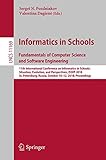Informatics in Schools. Fundamentals of Computer Science and Software Engineering [electronic resource] : 11th International Conference on Informatics in Schools: Situation, Evolution, and Perspectives, ISSEP 2018, St. Petersburg, Russia, October 10-12, 2018, Proceedings / edited by Sergei N. Pozdniakov, Valentina Dagienė.
Contributor(s): Pozdniakov, Sergei N [editor.] | Dagienė, Valentina [editor.]
| Dagienė, Valentina [editor.] | SpringerLink (Online service)
| SpringerLink (Online service) .
.
Material type:  BookSeries: Theoretical Computer Science and General Issues: 11169Publisher: Cham : Springer International Publishing : Imprint: Springer, 2018Edition: 1st ed. 2018.Description: XI, 396 p. 77 illus. online resource.Content type: text Media type: computer Carrier type: online resourceISBN: 9783030027506.Subject(s): Education -- Data processing
BookSeries: Theoretical Computer Science and General Issues: 11169Publisher: Cham : Springer International Publishing : Imprint: Springer, 2018Edition: 1st ed. 2018.Description: XI, 396 p. 77 illus. online resource.Content type: text Media type: computer Carrier type: online resourceISBN: 9783030027506.Subject(s): Education -- Data processingRole of programming and algorithmics in Informatics for pupils of all ages -- Exploring Control in Early Computing Education -- Autonomous Recovery from Syntactical Errors with Primary School Children -- The efficiency of teaching programming in elementary and secondary schools -- A case study on the effect of using an anchored-discussion forum in a programming course -- Students teach a computer how to play a game -- Teaching Programming and Algorithmic Complexity with Tangible Machines -- A Diagnostic Tool for Assessing Students' Perceptions and Misconceptions Regarding the Current Object "this" -- On Preferences of Novice Software Engineering Students: Temperament Style and Attitudes Towards Programming Activities. -National concepts of teaching Informatics -- Standards for Higher Secondary Education for Computer Science in Germany -- Computer Science Teachers Perspectives on Competencies - A case study in the Kingdom of Saudi Arabia -- A core informatics curriculum for Italiancompulsory schools -- Comparative analysis of the content of school course of informatics in Russia and subjects of the international competition Bebras -- Teacher education in Informatics -- Computational Thinking: Constructing the Perceptions of Pre-service Teachers from Various Disciplines -- Investigating PCK development of primary school teachers attending a MOOC on Scratch -- Informatics and computational thinking: a teacher professional development proposal based on social-constructivism -- Real time classroom systems in teachers' training -- Case Study on the Process of Teachers Transitioning to Teaching Programming in Python -- An Investigation of Italian Teachers' View on Coding and Programming -- The Quality of Teaching - Learning from Difference between University Teachers and School Teachers -- Contests and Competitions in Informatics -- Piaget's Cognitive Development in Bebras Tasks - A Descriptive Analysis by Age Groups -- Second Decade of Informatics in Secondary Schools in the Netherlands -- The Bebras Contest in Austria - Do Personality, Self-Concept and Attitudes play an Influential Role -- Gender differences in graph task - Do they exist in high school Bebras categories too -- Differences between 9-10 years old pupils' results from Slovak and Czech Bebras contest -- Problem Solving Olympics: an inclusive education model for learning Informatics -- Socio-psychological aspects of teaching informatics -- Evaluation of learning informatics in primary education. Views of teachers and Students -- How an ambitious informatics curriculum can influence algebraic thinking of primary school children -- Computer tools in teaching and studying Informatics -- Gamification of Problem Solving Process based on Logical Rules -- Music Computer Technologies in Informatics and Music Studies at School for Children with Deep Visual Impairments.
This book constitutes the proceedings of the 11th International Conference on Informatics in Schools: Situation, Evolution and Perspectives, ISSEP 2018, held in St. Petersburg, Russia, in October 2018. The 29 full papers presented in this volume were carefully reviewed and selected from 74 submissions. They were organized in topical sections named: role of programming and algorithmics in informatics for pupils of all ages; national concepts of teaching informatics; teacher education in informatics; contests and competitions in informatics; socio-psychological aspects of teaching informatics; and computer tools in teaching and studying informatics.


There are no comments for this item.